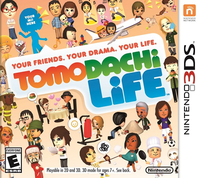| Site Notice |
|---|
|
We have a limited coverage policy. Please check our coverage page to see which articles are allowed. |
Difference between revisions of "Tomodachi Life"
CebolaBros64 (talk | contribs) (update infobox) |
|||
| Line 27: | Line 27: | ||
'''Tomodachi Life''' ('''Tomodachi Collection: Shin Seikatsu''' in Japan and '''Chin'gumoa Apateu''' in South Korea) is a game for [[Nintendo 3DS]] and the second game in the [[Tomodachi series]]. | '''Tomodachi Life''' ('''Tomodachi Collection: Shin Seikatsu''' in Japan and '''Chin'gumoa Apateu''' in South Korea) is a game for [[Nintendo 3DS]] and the second game in the [[Tomodachi series]]. | ||
| + | |||
| + | Fight | ||
| + | Two miis can have a fight in Tomodachi Life. They will throw stuff at each other, or tug on the same item. They will either make up, | ||
| + | or not forgive them. | ||
| + | Huge Fight | ||
| + | Two miis throw stuff at each other, but when the fight is done both miis refuse to make up. One of the friends has to help both people make up. | ||
==Summary== | ==Summary== | ||
Revision as of 01:05, 26 August 2020
| Tomodachi Life | ||||||||||||||
| トモダチコレクション 新生活 Tomodachi Collection: New Life | ||||||||||||||
| ||||||||||||||
| ||||||||||||||
| ||||||||||||||
| ||||||||||||||
|
Tomodachi Life (Tomodachi Collection: Shin Seikatsu in Japan and Chin'gumoa Apateu in South Korea) is a game for Nintendo 3DS and the second game in the Tomodachi series.
Fight Two miis can have a fight in Tomodachi Life. They will throw stuff at each other, or tug on the same item. They will either make up, or not forgive them. Huge Fight Two miis throw stuff at each other, but when the fight is done both miis refuse to make up. One of the friends has to help both people make up.
Summary
Like its predecessor Tomodachi Collection, the game involves the player overlooking apartments with Miis created by the player. The Miis will play, interact with each other, and are able to get married and have children. It is possible to play minigames with the Miis.
This game is the first in the series to have been officially localised outside of Japan.
References
|
| This article is a stub. You can help NintendoWiki by expanding it. |

